Discussion Topics
Recommended activity that can be done with all age levels.
Request students write a paragraph/essay of how
(a) a particular day of the Consecration had meaning to them or
(b) what they thought was an impact the Consecration journey had on their own
spiritual journey.
For students K through second grade, this can be an oral activity. In grades 3-5, this may be a paragraph, and for the older grades, this can be a longer writing assignment such as an essay. This assignment can be given weekly during the 33 day Consecration journey or could be given as a single writing assignment for the Consecration journey. We have seen with individuals who have made this Consecration journey more than once, that different days will take on particular meaning. In particular times and later when the Consecration is revisited for Consecration renewal some months or a year later, a different day seems to resonate with the soul.
Grade Specific Discussion Topics
This Consecration journey is anchored with an allegory which is a springboard to explore fundamentals of our faith and the beautiful act of making a Consecration to Jesus through Mary. You will also see when possible additional stories are used in the discussion questions to illustrate an idea. Both children and adults learn more easily and are engaged through the telling of a story. When appropriate quotes are provided from the Catechism of the Catholic Church, Sacred Scripture and quotes from Saints.
(Ages are provided per grade for those schools in countries where the grade levels differ.)
Kindergarten (approximate age 5, 6) THEME: MEETING MARY Discussion Topic and Drawing Activity: Who is Our Blessed Mother?
(topic relates to multiple days of the Consecration journey see below)
- Can you describe her personality? Can you draw her? (Pictures presented in the Child Consecration book are one child’s interpretation of how Mary would appear, but children are encouraged to draw Mary as they envision her.)
- Reference the text for characteristics of Mary to aid in the discussions on subsequent days of the week:
- Day 2: She loves us. She is tender. She is pure as a lily. She is without blemish. She is full of grace.
- Day 3: She trusts God.
- Day 4: She is the Mother of Jesus
- Day 5: She is humble.

First Grade (approximate age 6, 7) THEME: MARY AS OUR MOTHER Discussion Topic: Mary as a Mold of Holiness
(topic relates to Day 3 in the Child Consecration book)
- Has anyone made a candle from other candles? At Church often when there are just little stubs of candle left these are discarded. Families often will take these home and use the little stubs of candle for their family prayers. When this becomes a puddle of wax and turns hard, they are put in a basket. When many bits of wax have been collected after many months these can be melted down and poured into a mold. The bits of discarded wax may have some of the burnt wick. In general, the appearance of the bits is pretty dirty. Yet once the wax is melted and some light blue dye is added, the new candle that forms looks beautiful. Only a very discerning eye can see the tiny flecks of the burnt wick that remain. This doesn’t matter because the candle is beautiful and will also burn and create great light.
- Let’s connect this process of candle making to our Blessed Mother: Mary’s first role was one of a mother. She carried Jesus in her womb, which is in many ways like a mold. Through her motherhood, she helped to form Jesus and birth Him into this world. Our Blessed Mother wants to form us in holiness. If we bring to her ourselves, both strengths and our weaknesses, including our imperfections, as a mother she can help us be formed in holiness. Our little imperfections are not as noticeable when Our Blessed Mother is tending to us and molding us in holiness. Just as the candles with dirty wicks were placed in a mold and a soft blue dye was added, the final product was one of great beauty. So, too, our Blessed Mother can help us overcome our weak tendencies.
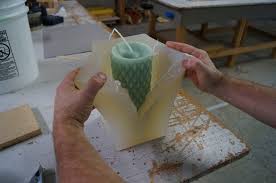
Second Grade (approximate age 7, 8) THEME: TO JESUS THROUGH MARY Discussion Topic: Mary Presenting Jesus to Us
(topic relates to Day 31 in the Child Consecration book)
- On the cover of the book we see Mary presenting her Son to us. Why do you think this is a good image for Consecration? To Consecrate ourselves to Jesus means that we give our lives to Him. The book we are reading helps us to reach Jesus through his mother Mary. Our Blessed Mother helps us to meet her Son and have each of us develop a relationship with Him.
- Why do you think Our Lady is presenting her Son as a child to us? Jesus first appeared to us in the world as a baby born of his mother Mary. Shepherds came to kneel before him before kings did the same. We are called to draw close and not be frightened. Babies love to have children interact with them, so you can imagine how much the baby Jesus would love to have you draw near.
- Why do you think it is better to have Our Blessed Mother spiritually with us as we come before Jesus? Our Blessed Mother Mary brings us to Jesus to help us to get to know Him better. Likewise, she presents us in the most beautiful way to Her Son. Mary is loved by Jesus and whatever she brings Him is always more pleasing when it is presented by her.
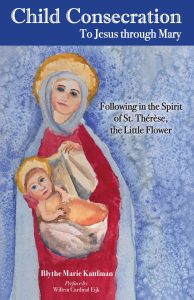
Third Grade (approximate age 8, 9) THEME: HUMILITY Discussion Topic: Humility
(topic relates to Day 7 in the Child Consecration book)
- Did Our Lady ever deny the good things God had done for her. No, see her Magnificat: “My soul proclaims the greatness of the Lord; my spirit rejoices in God my Savior. For He has looked upon His handmaid’s lowliness; behold from now on will all ages call me blessed.” (Lk 1:46-48)
Indeed the prophetic words of Mary have come to pass. The Church to this day gives great honor to Mary. The Church calendar has many days specifically designated to give her honor such as the Assumption of Mary on August 15 each year. This is when we remember how she was brought body and soul from earth to Heaven. Her Conception also has a specific Feast day on December 8. Her birthday is also honored on September 9. These are just a few of the days when the Church draws special attention to the Mother of God. Mary is the model of humility par excellence but this does not prevent her from drawing attention to the good that God is doing through her. We should learn from Mary how one is able to acknowledge God’s gifts as a means of glorifying God. - Is a humble soul downtrodden? “God loves a cheerful giver” (2 Cor 9:6) No, a humble soul is not negative, rather one can anticipate a soul with great humility is full of joy. Accomplishments completed serve to give God glory, and in all things we should seek God’s Will. We know from Day 13 of the Consecration that God gives us gifts and talents and that there is an expectation that we will use them. Thus when we work in God’s vineyard we do not have to see ourselves in a negative light, rather we should pray to see ourselves as God sees us. For we know from Scripture that “Before I formed you in the womb I knew you” (Jeremiah 1:5). Our relationship with Our Heavenly Father is not new; it is a love that has been watching over us and thinking of us since before we even existed.
- Is seeing God’s hand at work in our lives and praising Him true humility? Yes. A humble soul sees God’s blessings in all things. The lips of a humble soul are quick to praise God as the soul sees that God is sustaining us and blessing our work. When there is a bounty, we are grateful to God and when the harvest is less, a humble soul responds with trust that our needs will be met. A humble soul always looks for ways to draw attention to the good work of God in us, through us and around us.
- How do we grow in the virtue of humility? One of the ways is through prayer of the Rosary.
- Do you know the mystery of the Rosary in which the fruit is humility? The fruit of the first Joyful Mystery, the Annunciation, is humility. Praying the Rosary is a gentle and powerful way to grow in virtue. Often when we ask God to help us to grow in a specific virtue, He will give us many opportunities to practice the virtue. This can be a more difficult way to grow in virtue. Praying the Rosary on a daily basis, however, allows us to grow in a more gradual and gentler way in all the virtues.
- Our Blessed Mother embodies the virtue of humility in a beautiful way. If we want to get to know Our Blessed Mother better and seek her advice, how do we do this? The way we seek Mary’s help is through prayer. She speaks to us through prayer. Mary’s voice is not a voice like your teacher explaining an assignment for class, rather it is something more gentle. After you have brought your concern to your Heavenly Mother, you may find later several people encourage you in a direction that brings resolution to your concern. You will begin to see God works through people. At holy Mass, when Scripture is read, a particular part of the reading may seem to jump out or touch your heart in a very special way. The words may often seem to guide you in the area you had concerns. The priest at Mass during his homily may seem to be speaking right to you. One might wonder how this is possible, but when you turn your heart to prayer you will begin to see God’s work in many ordinary things around you. During the readings of this Consecration, you may find particular days of the Consecration have great meaning to you. In a year’s time when you are to do this Consecration journey again, different portions may then touch your heart. As you spend more time in prayer, you will begin to see a change in yourself.
- The key is time. We need to spend time with Our Blessed Mother, and we will begin to understand her ways. She will become like a friend. As you spend time with a friend you begin to take on characteristics of that friend. Blessed Bartolo Longo states, “Just as two friends, frequently in each other’s company, tend to develop similar habits so too, by holding familiar [conversations] with Jesus and the Blessed Virgin, . . . we can become, to the extent of our lowliness, similar to them and can learn from these supreme models a life of humility, poverty, hiddenness, patience and perfection.”
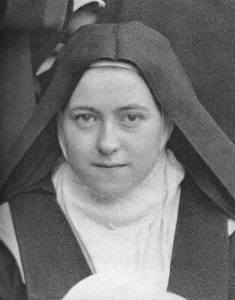
Fourth Grade (approximate age 9, 10) THEME: A SEED MUST DIE TO BEAR FRUIT
(topic relates to Day 22 in the Child Consecration book)
- What is meant by dying to oneself? Our Lord gives us a wonderful image in Scripture when it says that “unless a grain of wheat falls to the ground and dies it remains just a grain of wheat; but if it dies it produces much fruit”(John 12:24). From this we know that this process is fruitful and good.
- How do we do this? St Therese the Little Flower gives us examples in her “little way”. When St. Therese would see a sister in the convent that she didn’t like, instead of avoiding her, she gave her a smile. She would do little services for the sisters. One of the things which is a natural human inclination is to judge others. Yet Our Lord would ask us not to be the judge and reserve this role to Him alone. “Judge not, and you shall not be judged.”(Luke 6:37) This is contrary to our will yet we must conquer it to more perfectly unite to the will of God. A story of St. Therese helps us to see the wisdom of not judging others.
“During recreation the portress rang twice; the large workman’s gate had to be opened to bring in some trees for the crib. Recreation was not too gay because you were not there, dear Mother, and I thought that if they sent me to serve as third party I would be happy; at exactly that moment Mother Subprioress told me to go and serve in this capacity, or else the Sister who was at my side. Immediately I began to untie our apron but slowly in order that my companion untie hers before me, for I thought of giving her pleasure of serving as third party. The Sister who was replacing the Procuratrix was looking at us, and seeing me get up last she said: “Ah! I thought as much, that you were not going to gain this pearl for your crown, you were going too slowly.” Therese goes on to share “Certainly, the whole community believed I had acted through selfishness, and I cannot say how much good such a small thing did to my soul, making me indulgent toward the weaknesses of others. This incident prevents me from being vain when I am judged favorably because I say to myself: Since one can take my little acts of virtue for imperfections, one can also be mistaken in taking for virtue what is nothing but imperfection.” (Story of a Soul pg 221-222)
- Can each of you think of a person in your home that you find you are always judging. Is it particularly hard for you to share a smile with this person? Do you find a person that when you are around them you lose your peace such that you might raise your voice or say an unkind word. St. Therese would carry little beads with her and when she did something that was hard such that it was contrary to her feelings she would move the bead on the string. They were sacrifice beads. With practice the act of being kind to those who are the most difficult to love allows us to learn to seek in all things how God would want us to act and not how our emotions would lead us. This helps us a great deal in the road to holiness which is the vocation God is calling each of us to pursue.
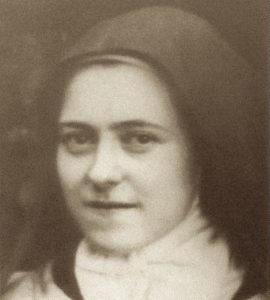
Fifth Grade (approximate age 10, 11) THEME: BLESSED VIRGIN MARY UNIQUE AMONG HUMANS Discussion Topic: How is Mary different from other humans?
(topic relates to Day 3 in the Child Consecration book)
- Discuss the Immaculate Conception. This means Mary was born without original sin.
- Catechism of the Catholic Church: 491 “Through the centuries the Church has become ever more aware that Mary ‘full of grace’ through God, 134 was redeemed from the moment of her conception. That is what the dogma of the Immaculate Conception confesses, as Pope Pius IX proclaimed in 1854:
The most Blessed Virgin Mary was, from the first moment of her conception, by a singular grace and privilege of almighty God and by virtue of the merits of Jesus Christ, Savior of the human race, preserved immune from all stain of original sin. 135”
- Catechism of the Catholic Church: 491 “Through the centuries the Church has become ever more aware that Mary ‘full of grace’ through God, 134 was redeemed from the moment of her conception. That is what the dogma of the Immaculate Conception confesses, as Pope Pius IX proclaimed in 1854:
- Discuss Mary “ever-virgin”
- This topic can be discussed in general terms to explain that a normal human father was not needed to conceive the baby Jesus but rather that the Holy Spirit descending on Mary allowed Mary to conceive the child Jesus. This is a mystery but is rooted in our faith as outlined in the Catechism of the Catholic Church. For reference see Catechism teaching on this topic.
- Catechism of the Catholic Church:
- 496 “From the first formulations of her faith, the Church has confessed that Jesus was conceived solely by the power of the Holy Spirit in the womb of the Virgin Mary, affirming also the corporeal aspect of this event: Jesus was conceived by the Holy Spirit without human seed.’ 146 The Fathers see in the virginal conception the sign that it truly was the Son of God who came in a humanity like our own. Thus St. Ignatius of Antioch at the beginning of the second century says:
- You are firmly convinced about our Lord, who is truly of the race of David according to the flesh, Son of God according to the will and power of God, truly born of a virgin,. . . he was truly nailed to a tree for us in his flesh under Pontius Pilate. . . he truly suffered, as he is also truly risen.” 147
- 497 “The Gospel accounts understand the virginal conception of Jesus as a divine work that surpasses all human understanding and possibility:148 ‘That which is conceived in her is of the Holy Spirit,’ said the angel to Joseph about Mary his fiancee.149 The Church sees here the fulfillment of the divine promise given through the prophet Isaiah: ‘Behold, a virgin shall conceive and bear a son.’” 150
- 498 “People are sometimes troubled by the silence of St. Mark’s Gospel and the New Testament Epistles about Jesus’ virginal conception. Some might wonder if we were merely dealing with legends or theological constructs not claiming to be history. To this we must respond: Faith in the virginal conception of Jesus met with the lively opposition, mockery or incomprehension of non-believers, Jews and pagans alike;151 so it could hardly have been motivated by pagan mythology or by some adaptation to the ideas of the age. The meaning of this event is accessible only to faith, which understands in it the ‘connection of these mysteries with one another’ 152 in the totality of Christ’s mysteries, from his Incarnation to his Passover. St. Ignatius of Antioch already bears witness to this connection: ‘Mary’s virginity and giving birth, and even the Lord’s death escaped the notice of the prince of this world: these three mysteries worthy of proclamation were accomplished in God’s silence.’” 153
- Following up on the theme “to Jesus through Mary” as presented in Third Grade :
- Mary who as we have now learned is unique among humans now plays a very important role from Heaven. Since she has the singular grace of never having been tarnished by original sin nor ever committed sin on earth, when she presents something or someone before God it is most pleasing to God. Thus to seek her assistance to come before Our Lord is of great benefit to us.
- Catechism of the Catholic Church:
508 From among the descendants of Eve, God chose the Virgin Mary to be the mother of his Son. ‘Full of grace,’ Mary is ‘the most excellent fruit of redemption’ (SC 103): from the first instant of her conception, she was totally preserved from the stain of original sin and she remained pure from all personal sin throughout her life.”
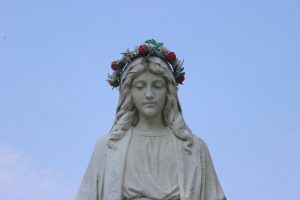
Sixth Grade (approximate age 11, 12) THEME: BEING THE EXTENDED HANDS OF JESUS AND MARY ON EARTH Discussion Topic: Work must be done by the laborers who are still on Earth
(topic relates to Day 6 in the Child Consecration book)
Saint Jean Marie Vianney as an example of being the extended hands of Our Lord and Our Lady:
- Keeping up with his brother: In his childhood in the late 18th century in France, Jean Marie Vianney was needed to work in the fields. One story that is related in his biography describes how Vianney shortly after his first Communion went to work in the vineyard with his brother. He was unable to keep pace with his 18-year-old brother Francois. That evening he confided to his mother how he had fallen behind his brother in the field, and he was utterly exhausted. His mother was moved by this story and asked Francois to move slower to allow Vianney to keep up. Yet Francois felt with his age of 18 years many in the town would expect him to do more than his little brother. Providence saw to help this situation in a very beautiful way.
A religious nun came to visit the family and gave young Jean Vianney a statue of Our Lady. This he took with him to the field the next day. Before he began his task in the field, he kissed the feet of the statue of Mary and put it some distance in front of him. He labored in the field and when he reached the image he did as before. He picked up the statue and kissed it and moved it further in front of him. That evening as he came back to his mother he related, “Always trust the Blessed Virgin. I earnestly called upon her today, and she has helped me much, for I was able to keep up with my brother without being tired out.” He and his brother worked quietly in the field like trappist monks. Vianney would say to himself as he worked, “I must see to it that I till the soil of my soul and pull out all weeds so that it may be ready to receive the good seed.” - Vianney’s daily prayer life: Vianney also had the habit of blessing the hour through the day by praying a Hail Mary when the clock struck the hour and added the prayer, “Blessed be God! Courage, my soul! Blessed be the holy and Immaculate Conception of the Blessed Virgin Mary, Mother of God!”
- Great value can be found in the ordinary when we seek God’s will and unite our work and sufferings to the experiences of Christ: Vianney in his youth would help his father. According to the season he would till the ground, loosen the earth, gather nuts and apples, dig trenches and prune trees. Jean Marie saw all these activities as having great importance as he was able to offer them to God. Later he would reflect after becoming a priest, “ Oh what a beautiful thing it is to do all things in union with the good God! Courage, my soul, if you work with God; you shall indeed, do the work but he will bless it: you shall walk and he will bless your steps. Everything shall be taken count of, the forgoing of a look, of some gratification – all shall be recorded. There are people who make capital out of everything, even the winter. If it is cold they offer their little sufferings to God. Oh! What a beautiful thing it is to offer oneself each morning . . . to God!”
- If we give God Our Day through Mary with a morning offering all our little experiences have merit. Here is an example of a short morning offering you can say each day. Please copy this on a notecard and keep it by your bed to reach each morning as you awaken:
- Morning Offering: O my God, in union with the Immaculate Heart of Mary, I offer Thee the Precious Blood of Jesus from all the altars throughout the world, joining with it the offering of my every thought, word and action of this day. O my Jesus, I desire today to gain every indulgence and merit I can and I offer them, together with myself, to Mary Immaculate, that she may best apply them to the interests of Thy most Sacred heart. Precious Blood of Jesus, save us! Immaculate heart of Mary, pray for us! Sacred heart of Jesus, have mercy on us!
- In addition to your morning offering, it is also beautiful to find little experiences and uniting these to the experience of Christ during his Passion. For example, if you feel cold on the walk to church or school, unite it to the experience of Christ during his Passion when he was cold. We know it was cold the night he was taken from the garden of Gethsemane because we are told in Scripture that Peter was warming himself by the fire. Thus, we can take our experience of being cold in winter and unite it to the experience of Christ and offer this in such a way:
- Jesus I offer you all the times today when I am cold today and offer it up through the Immaculate Heart of Mary and unite it to the times you were cold Jesus during your Passion. Because of the merits of your experiences and the fact I unite my experience with yours, please allow my heart to be warm with love for you, God and my neighbor.
- In this way you allow your everyday experiences to help make you holy. These experiences also allow you to help Mary and Jesus more too through your little gifts. Here is another example:
- Jesus I offer you all the times today when I can’t do something myself or need help doing a task and offer that experience up through the Immaculate Heart of Mary to unite it to your experiences during your Passion when you could not do certain things or had to ask for help such as from Simon who helped you carry your cross. Because of the merits of your experiences and the fact I unite my experiences with yours, please pour out grace to help further Our Blessed Mother’s plans.
- In this we see we can help Mary throughout our day. Mary as we know is without sin and her will is perfectly united to the will of God so her plans are always directed to perfectly please and give glory to God. So it is very good to offer little sacrifices for the fulfillment of her plans.
- Activity for class: List three things in your day that you could offer up through the Immaculate Heart of Mary to unite to the experiences of Christ. For those in warm climates remember it was hot when Jesus was on the cross, since he lived in a desert, and it is certainly possible for it to be very cold at night and excruciatingly hot during the day (another example to share could be offering those times when we feel small, silly or little before others and unite them to the times Jesus felt little before others during his Passion). One could ask that due to the merit of Jesus’s experience and since we unite our experience with his that people more and more will see Jesus in us.

Seventh Grade (approximate age 12,13) THEME: DISCOVERING AND USING THE TALENTS/SEEDS GOD THE FATHER CHOSE FOR US Discussion Topic: Seeds Given by God
(topic relates to Day 13 in the Child Consecration book)
Discussion: Father was the one to provide the seeds. He chose what would be grown.
- Early and late use of seeds. One thing we know about seeds is that they are ideally used fresh by gardeners. Each year gardeners either save seeds from their harvest or order seeds. Sometimes gardeners will discard seeds that have not been used for several years expecting a lower germination rate and hence less fruit at harvest. There is truth that seeds used right away and not left to sit for years will spring up faster and more will germinate but there is also something very hopeful in seeds. Even if seeds are left for many years when planted in good soil germination can still occur. An excavation of an ancient Roman fortress, Masada, revealed a few Date Palm tree seeds. Three seeds were planted in 2005 and in 2008 it was reported one of the seeds germinated and the plant had grown to three feet in height. The seed was approximately 1,900 years old. Thus it is always good to begin to use the seeds and talents that have been given to us at a tender age but one should never lose hope and come to believe that it is too late to use a gift from God. We see from the Date Palm seed that with God all things are possible.
- Think about yourself. What seeds do you think God has given to you? Try not to think of what your friends or siblings have received but rather what God has given just to you.
- Example: in regards to the gifts we have been given and our use of them, imagine two friends playing golf. They are encouraging each other to do well and each is trying to do better than he himself did the last time he went out to play. Both players can do well and there is no disappointment when both shoot a personal best.
- Can you think of a time when a sibling or friend did well at something? Imagine seeing their achievements distinct from your own because it was your Loving Father who gave you different seeds and had not intended you to grow or pursue the fruits that others are growing.
- Meditate and think about your own seeds? You may have only received one and others may have received more. But our Lord has given you that one seed. If you do not know what your seed is, pray about it. Ask our Lord to show you what gifts He has given you and how He wants you to use them.
- In terms of time, have you made use of the talents and gifts God has given you? Can you see any fruits that have come through the seeds you were given to plant?
- Follow-up: “Mother showed Daisy how to get the biggest harvest that could be obtained from the seeds entrusted to Daisy by Father.” You have prayed to Our Lord to understand what seeds you were given. Now ask Our Lady to help you to get the biggest harvest. Our Lord will be looking to see you did not lose the seeds, but like the servants in the Gospels, He wants more than just our seeds back. He wants to see a return on those gifts…fruits!
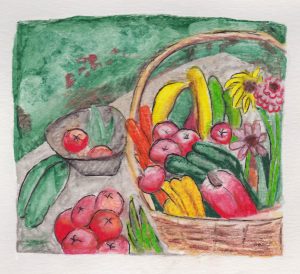
Eighth Grade (approximate age 13, 14) THEME: ABANDONMENT TO THE PROVIDENCE OF GOD Discussion Topic: Divine Providence
(topic relates to Day 28 in the Child Consecration book)
- What is meant by Divine Providence? Providence does not mean something always turning out well. Let us think of Joseph from the Old Testament. He is sold as a slave by his brothers. He is hurt and suffers greatly. Yet without such a path to Egypt, he would not have had the opportunity to guide Pharaoh and prepare the Egyptians for the coming famine. Even his father and family are saved through the store of food Joseph helped to establish.
- How does being a farmer or a gardener help one to understand the providence of God?
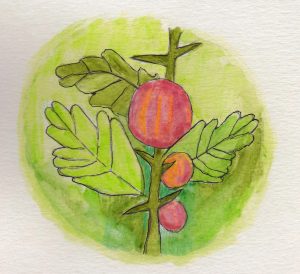
9th Grade (approximate age 14, 15) THEME: BECOMING STRONG IN VIRTUE Discussion Topic: Growing Strong in Virtue
(topic relates to Day 20 in the Child Consecration book)
- What does it mean that the Mother did not rush the seedlings out of the greenhouse? How could one imagine this relates to Our Heavenly Mother watching over us as we grow? Our Blessed Mother is a wise parent and teacher. She is gentle and does not rush the development of a foundation. In the garden one can see how strong fertilizers can speed up the growth of the top part of the plant but the roots may not have matured fully with this approach. With harsh weather the plant can be uprooted or break. Our Blessed Mother does not want this to happen to us. She is patient and takes time in forming souls in holiness and virtue.
- Is there a benefit to allowing one to grow strong in virtue before one is tested by the strength of the winds of temptation? One can see how parents may limit exposure to places where there may be occasion for sin. This is good. Sometimes we need to use our own willpower to not place ourselves in a place where we may have occasion to sin. This may be very difficult, but our spiritual well-being is of supreme importance. Of course, once one is old enough or strong enough in virtue, it is often necessary to allow oneself to be tested by the winds of temptation; this is part of the reason God allows such things to exist. Nevertheless, resistance to caving to temptations is essential.to a robust spiritual journey.
- Consider the last part of the Act of Contrition: “I firmly resolve with the help of Your Grace to sin no more and to avoid the near occasion of sin.” What does it mean to avoid the near occasion of sin? How can you do this?
- Let us share a story from the garden. Recently we came upon a large green worm called a tomato hornworm living on our tomato plant. It had a horn upon its head and upon its back were many white objects that looked like eggs. These eggs were not from the worm but rather from a wasp. As the eggs hatch, the larvae feed upon the hornworm. Slowly they consume the inner organs leaving the vital ones to the last. The hornworm slowly dies. It never matures and remains always in the garden. Let us consider the hornworm as an example of how we may exist in God’s garden. Everything we need is within the garden. Yet we are not meant to stay there; we are just sojourners on our way to our true home in Heaven. The hornworm is not meant to always crawl upon a branch of a tomato stem. Rather it is meant to grow, transform and spread its wings that allow it to fly out of the garden. Let us consider the wasp eggs as those influences in our lives that seek to tie us to the garden and prevent us from considering that we are not meant to stay in the garden but rather pass through it to our true home. These influences slow us and make us numb to the beauty that is within us and how precious our soul is for our eternal life. Innocence and purity seem to have little value in the world today; in secular Western society, Catholic teachings on these matters seem to be endlessly derided and mocked. It can be difficult to hold to these ideals when one is a teenager and still finding a place in society when many of one’s friends or acquaintances may consider one to be ridiculous or even “weak” for attempting to avoid sinful occasions. Regardless, one must recognize what order one’s priorities must be in. It is hardly ever an easy decision to follow God’s call to avoid temptation, yet it is absolutely necessary if one is to lead a Godly and holy life, for both innocence and purity have immense value in the spiritual realm. We are meant to protect our interior self. This can be difficult when we are young as we do not even perceive when things may be working to erode that which is so precious. Yet here we have been given gifts both through our parents and through our relationship with God. Our parents have spent more time in the garden and have a better vantage point to see the dangers that may be working on our back. They can protect us in many ways through distancing us from influences that are putting in jeopardy our spiritual gifts we have within ourselves. We also have Our Heavenly Mother and Father who wish to help us. They can help to remove those white eggs that if left will consume us. But we need to ask for such help. This Consecration journey is our request for help. But we can also see that we need to remain close to God and His Mother to keep a vigilant watch lest new eggs are placed on us.
- Why should we strive to become virtuous and set as our goal heaven instead of pleasure and worldly possessions? If pleasures are enjoyed now, why endure hardship and avoid sin? “What doth it profit a man if he gain the whole world and suffer the loss of his soul?”
- What is at stake? Our Soul
- We have discussed how important it is to avoid sin or the occasion of sin, but why is this so important? The answer is that mortal sin drives Our Lord from our hearts and if present and unconfessed can result in our soul being lost for all time. When we say for all time it is interesting to contemplate what that means.
- St. Anthony Mary Claret in his autobiography shares that this was something that played upon his thoughts in his youth. “I used to think of eternity, of that forever and ever. My imagination pictured enormous distances, and to these I added still more and more, but seeing that they did not reach an end, I trembled and began to think: Will the sufferings of those who go into everlasting punishment never end? Will they have to suffer forever? Yes, they will have to suffer forever and ever. . . . This caused me much sorrow.”
- Yet we have every opportunity to make amends with God while on earth. He is waiting and even pursuing us always with his love. He stands ready with outstretched arms to forgive us and welcome us into His embrace.
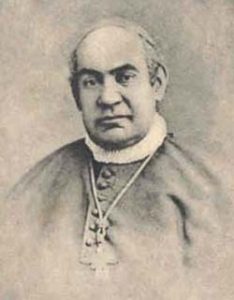
10th Grade (approximate age 15, 16) THEME: SUFFERING AS A GIFT Discussion Topic: Suffering
(topic relates to Day 23 in the Child Consecration book)
- How do we know that God wants us to embrace the crosses/sufferings given to us?
- Then Jesus said to His disciples, “If anyone wants to come after Me, he must deny himself, take up his cross, and follow Me.” (Matthew 16:24)
- St. Anthony Mary Claret speaks of suffering, “All disagreeable, painful and humiliating happenings I consider as coming from God and ordered by Him for my own good. Even now, as I think of it, I fix my mind on God when such things occur, bowing in silence and with resignation to His most holy will; for I remember that Our Lord has said that not even a hair of our head shall fall without the will of our heavenly Father, who loves us so much.” (pg 116 of Autobiography)
- St. Therese and Suffering
- Suffering is not always physical. It can also be experienced through disappointment. We see this through St. Therese’s experience with the spiritual director she was given when she entered Carmel to become a nun. “Upon entering Carmel, I met one who was to serve me in this capacity [Spiritual Director] but hardly had I been numbered among his children when he left for exile. Thus I came to know him only to be deprived of him. Reduced to receiving one letter a year from him to my twelve, my heart quickly turned to the Director of directors, and it was He who taught me that science hidden from the wise and prudent is revealed to the little ones.”
- She goes on to say “The little flower transplanted to Mount Carmel was to expand under the shadow of the cross. The tears and blood of Jesus were to be her dew, and her Sun was His adorable Face veiled with tears.” St Therese or the little flower as she called herself developed a strong devotion to the Holy Face of Jesus. She would share, “Ah! I desired that, like the Face of Jesus, my face be truly hidden, that no one on earth would know me. I thirsted after suffering and I longed to be forgotten.”
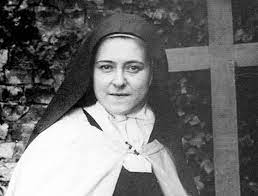
11th Grade (approximate age 16, 17) THEME: SIMPLICITY IN A SOUL Discussion Topic: Growing in Simplicity
(topic relates to Day 24 in the Child Consecration book)
- Description of a Simple Soul by St. Francis de Sales: “When a simple soul is to act, it considers only what it is suitable to do or say and then immediately begins the action, without losing time in thinking what others will do or say about it. And after doing what seemed right it dismisses the subject; or if, perhaps, any thought of what others may say or do should arise, it instantly cuts short such reflections, for it has no other aim than to please God, and not creatures, except as the love of God requires it. Therefore, it cannot bear to be turned aside from its purpose of keeping close to God, and winning more and more of His love for itself.” (Quote from book Cultivating Virtue: Self Mastery with the Saints)
- Examine the text of Day 24 with an additional portion of St. Therese’s autobiography not included in Child Consecration day 24: Once when St. Thérèse was participating in recreation, a saintly Novice Mistress spoke to her. She stated, “My child, it seems to me you don’t have very much to tell your Superiors.” Thérèse asked why the Mother thought this. The nun responded, “Because your soul is extremely simple, but when you will be perfect, you will be even more simple; the closer one approaches to God, the simpler one becomes.” St. Thérèse relates, “The good Mother was right; however, the difficulty I had in revealing my soul, while coming from my simplicity, was a veritable trial; I recognize it now, for I express my thoughts with great ease without ceasing to be simple.”
- Discussion: Interpret the meaning behind St. Therese’s words.
- Discuss the approach described by St. Francis de Sales in regards to our actions and what we say and how this seems echoed by St. Therese who writes her autobiography toward the end of her short life. She died at age 24. When one examines the quote by St. Francis de Sales one sees that the intention of the soul is very important to God. If the intention of the soul in saying something is holy and directed to please God then the soul should not lose thought or effort continuing to reflect on how that phrase, action or comment is perceived by others.
- Why do you think God desires simplicity in a soul?
- Think of yourself. Do you see simplicity in your soul?
- How do you think you could grow in simplicity?
- Quote to discuss from the book Abandonment to Divine Providence by Jean-Pierre de Caussade: “The more obscure the mystery to us, the more light it contains in itself. This is why a simple soul will discover a more divine meaning in that which has the least appearance of having any.”
- Discussion ideas: this book looks at ordinary things through a lens of simplicity and finds meaning in them. One can see how a child can look at the smallest things in nature and give them great attention and thought. Simplicity is to be treasured.

12th Grade (approximate age 17, 18) THEME: TRUST Discussion Topic: Complete Trust in Jesus
(topic relates to Day 26 in the Child Consecration book)
- How is trust different from faith?
A story was shared by Bishop Keenan of Scotland during the Consecration journey. He described how a stuntman crossed Niagara falls walking on a wire with no harness. He pushed a wheelbarrow of rocks. When he got across a person said, “I knew you could do it.” The stunt man responded, “Then why don’t you come back with me in the wheelbarrow?” The person had faith the stunt man could cross Niagara falls, but he did not trust him to put his own life in his hands. Our Lord calls us to not only have faith in Him but also to trust Him to care for us. - Proverbs 3: 5-6
“Trust in the Lord with all your heart, on your own intelligence do not rely; In all your ways be mindful of him, and he will make straight your paths” - Discuss how trust in God impacts you as you leave high school and make life decisions.
- As one finishes high school there is a sense of accomplishment. Many may congratulate you and ask you what you have decided to pursue. Do not rely simply on your own intelligence to choose what path you shall follow instead turn to God and ask for His direction. Ask God in prayer to show you how you can use the gifts He has given you. We each are given a mission by God. This is something God has planned for each of us. It is part of His plan and we play a very important role. If we never seek to understand our true mission we may find ourselves restless. St. Augustine has a beautiful quote he said, “you have made us for yourself, O Lord, and our heart is restless until it rests in you.” We are not made for ourselves but instead to know love and serve God. Resting in God is loving God. When we are completely in love with God we trust in Him to guide us. It is His pleasure we seek not our own.
- Trust in God as the best of Fathers to know what is perfect for you and to lead you down a path that will allow you to give Him Glory. Trust that God has great joy planned for you. As one draws closer to Christ one can even find joy even in suffering. Yet when we are far from Christ the greatest pleasures never seem to satisfy us nor do they bring true joy.
- Thus we should not hold anything back from Our Lord. Some may portion out our lives and give God permission to act in certain parts of our lives but shut Him out of other portions such as in a romantic relationship. Yet here we must reflect on Proverbs and see that we are called to “Trust in the Lord with all your heart” not just a portion. God wants all of us. He wants us to get in his wheelbarrow as in the example above and head out into uncharted areas confident that He knows the best of it.
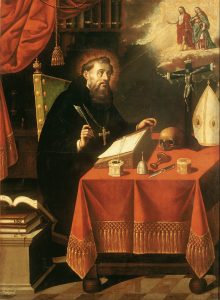
Please help us get the word out! Those interested in featuring the new book should email blythe.kaufman@gmail.com